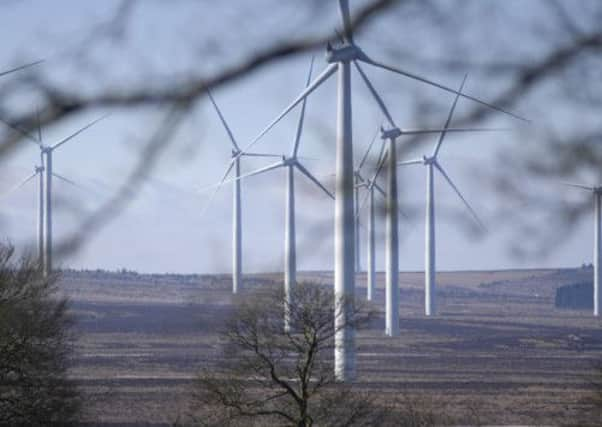Leaders: Sensible move on wind farms has pitfalls


To others they are an abomination – a series of ugly scars on the landscape and an uneconomical fantasy as an energy policy.
This newspaper has always tried to take a practical view – backing a mixed-energy policy for Scotland, of which wind power is an increasingly important component, while appealing for common sense on where they are sited. It is heartening to find the Scottish Government taking a similarly sensible view with yesterday’s announcement on new regulations. These would bar windfarms from national parks and designated areas of scenic beauty, as well as limit their development close to towns and villages. Scotland’s great wildernesses would be protected.
Advertisement
Hide AdAdvertisement
Hide AdThis makes a great deal of sense. There are some vistas in this country that rank among Scotland’s greatest treasures. The panoramic view of Glen Coe that featured so dramatically in the latest Bond movie Skyfall is never likely to be a contender for a couple of dozen wind turbines, but it would indeed help bring clarity to the debate if people knew categorically which areas were out of bounds and which were not.
The new emphasis on proximity to dwellings is also welcome. There are some corners of Scotland with large turbines cheek by jowl with housing estates. This has always seemed incongruous to the eye and problematic for local residents. It should be a right not to live quite literally in the shadow of a giant generator.
There are, of course, potential pitfalls aplenty in this policy. The first is the obvious one of how one defines a wilderness. Ministers can be assured that every line they draw on a map to specify a protected area will be hotly contested by local campaigners.
The second is that creating a protected area also, ipso facto, creates a less protected area. Those parts of Scotland that are never likely to be defined as wilderness will, one assumes, therefore face a higher concentration of wind farms than would otherwise have been the case.
It would be unfortunate, to say the least, if the areas not defined as wilderness were to come to be seen as somehow easy prey for wind farm developers. This cannot be allowed to happen. Each application for planning permission in a non-wilderness area must be subject to just as much planning rigour as before. There can be no free for all.
But perhaps the most obvious problem is that, as opposition MSPs pointed out yesterday, this initiative comes too late for some communities and beauty spots that already have wind farm developments. New rules now are welcome, but ministers can expect a strong reaction from those for whom this new and foresighted advice comes a little too late.
Abuse of comedian isn’t funny
NEWSPAPERS and politicians have perhaps become too used to the bile that passes for much political commentary online, to the extent that there is a danger of becoming inured to its commonplace malevolence.
So the comments we report today by the Glasgow comedian Susan Calman are a necessary reminder – from someone not engaged daily in hand-to-hand political combat – of just how unacceptable the online abuse can be, and how vindictive the debate on Scotland’s future can sometimes become.
Advertisement
Hide AdAdvertisement
Hide AdWe Scots have always liked a laugh. Our sense of humour is one of those national characteristics we should and do take pride in. But it would seem from some of the reactions to Ms Calman’s recent radio appearance, in which she talked about the state of Scottish politics, that some Scots have mislaid the ability to laugh at ourselves, to take one on the chin and see the funny side, even when our views are somebody else’s punchline.
Ms Calman asks a perfectly reasonable question: Is there something about Scottish politics at this moment that makes some views and some personalities no-go areas when it comes to comedy? Have we really reached the stage where it is acceptable to make fun of English politicians but not Scottish politicians?
Judging by the comments hurled at her recently, some of our fellow Scots have undergone a humour bypass.
The independence referendum has thrown up some stark divisions and, quite understandably, strong views. But it would be no laughing matter if some political figures were regarded as beyond the comedy pale. Then, as a nation, the joke would be on us.